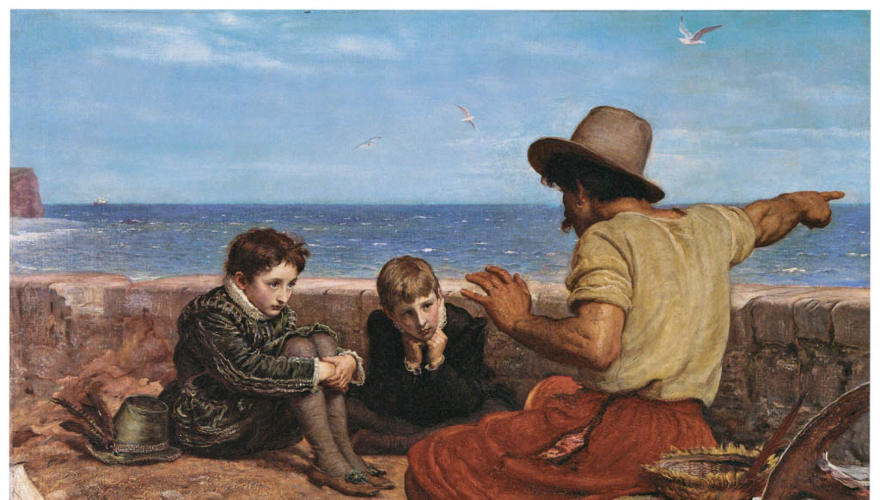A wonderful painting hangs on the wall of my office. This gift from my lovely wife is a reproduction of Millais’ The Boyhood of Raleigh, and I hope it continues working its way into my heart and imagination.
James K. A. Smith summarizes well the story behind this painting (2016, 92):
“Sir Walter Raleigh, you might recall, was one of Queen Elizabeth I’s intrepid explorers. He established some of the first British colonies in what is now North Carolina. But he also twice set sail in search of the elusive El Dorado. In the painting, Millais imagines just what creates such an adventurer and explorer. His hypothesis? A good storyteller. Raleigh and a young friend sit entranced by a wizened old sailor who is pointing to an immense sea, captivating them with tales of what lies on the other side. The story, on Millais’ interpretation, gives birth to a longing that will govern and direct all of Raleigh’s life.”
As I’ve considered this inspiring work of art, two observations have jumped off the canvas and doggedly refused to leave me alone!
First of all, I love the way this painting captures the deep power of storytelling, not only to excite or delight but to meaningfully engage and change. The boys in the frame are enjoying the tale but not in a saccharine way – they are not listening with wide smiles. Raleigh’s friend listens closely with his head in his hands. He’s paying attention. But, my eyes are drawn more towards Raleigh’s face. He stares slightly away from the sailor/storyteller, seemingly weighing both the story’s invitation with the personal costs it will claim on his life.
The boys’ faces reveal that the storyteller is offering more than mere entertainment (though that clearly has its place). They hear a serious summons, a call to different way of life. How will they respond? That invitation resonates loudly through all the great tales – you know, those stories that make us into different/better people. Jesus’ stories, for example, certainly entertained and provided intellectual insights. But their aim was to poke people in the heart, prodding hearers to discern their deepest desires and begin to live into a different/better story.
A second realization is that my own position, my place in the painting, is different than it used to be. My younger self would certainly have connected with the boy Raleigh. The tales I was told in Sunday School of David, Daniel, and dozens of other heroes made me understand that I come from a great family. And later on, in college, the stories of ministry and missions of the kingdom of God in Africa led me to leave behind what was familiar and serve these last 13 years in a wildly different context.
That time as a youth, soaking in the stories of God’s work in the past and present, was a good and necessary stage. But looking at the painting now, I understand that my part in this drama has changed. I am now to play the part of the old sailor. We can’t see his face – just his shabby clothing and his oversized mustache. His role is secondary. He simply and ably witnesses to what he has seen and heard, offering his hearers an invitation to a different kind of future. So while I used to be on the receiving end of the story (and certainly still need to be from time to time), my primary task at this stage in life is to pass on the tale, entrusting the Word’s power to effectively call others out to sea.
Storytelling has the power to motivate people like nothing else and God’s story woven together with our stories has for millennia moved people to participate in the grand adventure. A saying attributed to Antoine de Saint-Exupéry, the author of The Little Prince, beautifully puts it this way: ‘If you want to build a ship, don’t drum up people to collect wood and don’t assign them tasks and work, but rather teach them to long for the endless immensity of the sea.’” The sailor couldn’t, and shouldn’t, have known all that Raleigh would need to be a great explorer. The sailor/storyteller didn’t need to work through all the necessary details that day. Instead, the storyteller plants the seed. The storyteller cultivates the call of exploration and adventure by bearing witness and allowing the tale to captivate and call the hearer forward.
I’m grateful to have Millais’ The Boyhood of Raleigh hanging in my office. It’s a testimony to the power of story to shape us and our hearers into the kind of people who do not shrink back but answer the call of the sea.

- Sir Raleigh, Storytelling, and the Sea - June 19, 2023
- The King and the Kids’ Table - October 18, 2021
- Encouraging the ‘Why’ - August 9, 2021

Alan, this is so, so good. My husband and I loved your thoughts on how our roles change over time. I also love how this painting acted as a seed in your own life, growing into the insights you could share with us. God bless HIs work in Mozambique!
Beautiful! I hear the apostle John in your words- he shared what he has seen and heard of Jesus in 1 John . Thanks for sharing.